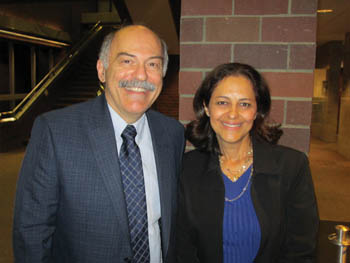DENISE ALTOUNIAN – Staff Writer

The Armenian people have a long and storied history in the Middle East. Armenians have left a legacy of success and hard work in countries such as Lebanon, Syria, Iran and Egypt. Dating back to their first interactions with Arab Muslims in the 7th century, Armenians have had almost constant contact with the Middle East in the centuries that followed.
This partnership continues today on the campus of Fresno State. Professor Barlow Der Mugrdechian, Coordinator of the Armenian Studies Program, served as a guest speaker for the MES10 class, “Introduction to the Middle East,” to address the impact of Armenians in the Middle East.
His talk “The Armenians in the Middle East and Diasporan Armenian Communities” detailed the history of the Armenians in the region, how these communities formed, and the future of Armenians in the Middle East.
Professor Der Mugrdechian was invited to speak as part of the Middle Eastern Studies Lecture, Performance & Film Series organized by Dr. Partow Hooshmandrad, Roshan Endowed Faculty in Persian Language & Culture, and Coordinator of Persian Language and Culture Studies at Fresno State.
The Middle East Studies Program was founded in 2009 and now offers a wide variety of classes as well as the opportunity to earn a minor. The course, “Introduction to the Middle East,” aims to demonstrate the diverse and rich culture of the region through history, art, music and literature.
“The Middle East is a very diverse place. There are so many beautiful and important ethnic groups in the Middle East, each with a rich cultural heritage. Each group has contributed in its own unique way to the region. These diverse communities have also lived together for centuries, exchanging ideas, learning from each other. Together, they have created a more interesting and beautiful place for all.”
“We wanted to make sure to do a lecture on the Armenians in the Middle East and Diaspora Communities, as an example of an ethnic group in the Middle that has made so many significant cultural and social contributions to the region,” stated Dr. Hooshmandrad, who emphasized the importance of highlighting ethnic diversity to break common stereotypes.
Although there were earlier established Armenian communities in the Middle East, the Armenian Genocide was the immediate cause for the formation of the large, dispersed Armenian population in the Middle East. Proximity to historic Armenia caused many survivors to settle in the Middle East.
An entire generation of Armenians saw their homeland destroyed, were forcefully uprooted and had to begin a new life in a foreign land.
Despite tragic circumstances large communities quickly formed in Egypt, Lebanon, Iran, Syria, Iraq, Israel, and Cyprus. These Armenians were tasked with starting their lives over, all while preserving their culture, language and religion.
The Armenian communities in the Middle East were able to integrate almost seamlessly into their new homes and at the same time preserve their Armenian identity. They formed communities in the major cities and began to thrive right away.
Today, the Armenians that remain in the Middle East have an institutionalized minority status. They have political representation in some countries and maintain autonomy in schools and communal government. The Armenian Church also has maintained its importance and today you can find Armenian churches throughout the region.
“The Armenians have made a significant contribution in the host countries where they live. They have continued to enrich the region and are an important element in the religious and cultural diversity of the Middle East,” said Prof. Der Mugrdechian.
The future of Armenians in the Middle East remains in question. Years of war and civil unrest have caused the population to decrease significantly. The continuing trend is for migration from these countries to the United States.
The Armenian people have left an important legacy in the Middle East. Only time will tell the future of the community.
 Hye Sharzhoom Armenian Action
Hye Sharzhoom Armenian Action